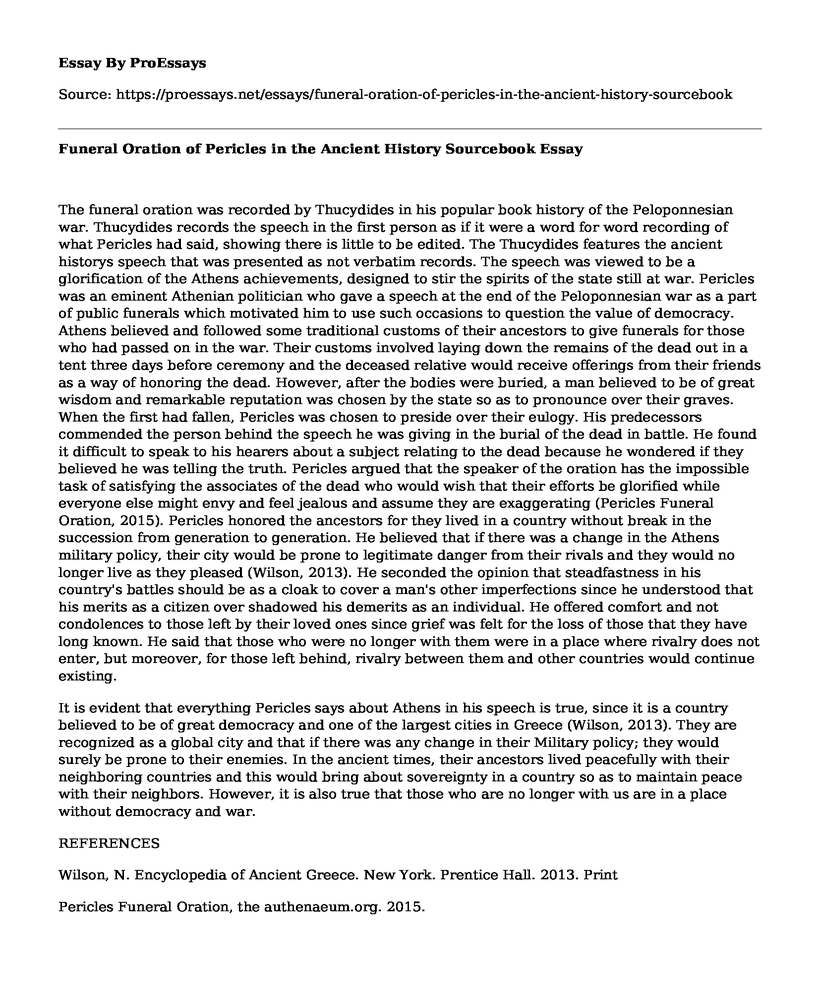The funeral oration was recorded by Thucydides in his popular book history of the Peloponnesian war. Thucydides records the speech in the first person as if it were a word for word recording of what Pericles had said, showing there is little to be edited. The Thucydides features the ancient historys speech that was presented as not verbatim records. The speech was viewed to be a glorification of the Athens achievements, designed to stir the spirits of the state still at war. Pericles was an eminent Athenian politician who gave a speech at the end of the Peloponnesian war as a part of public funerals which motivated him to use such occasions to question the value of democracy. Athens believed and followed some traditional customs of their ancestors to give funerals for those who had passed on in the war. Their customs involved laying down the remains of the dead out in a tent three days before ceremony and the deceased relative would receive offerings from their friends as a way of honoring the dead. However, after the bodies were buried, a man believed to be of great wisdom and remarkable reputation was chosen by the state so as to pronounce over their graves. When the first had fallen, Pericles was chosen to preside over their eulogy. His predecessors commended the person behind the speech he was giving in the burial of the dead in battle. He found it difficult to speak to his hearers about a subject relating to the dead because he wondered if they believed he was telling the truth. Pericles argued that the speaker of the oration has the impossible task of satisfying the associates of the dead who would wish that their efforts be glorified while everyone else might envy and feel jealous and assume they are exaggerating (Pericles Funeral Oration, 2015). Pericles honored the ancestors for they lived in a country without break in the succession from generation to generation. He believed that if there was a change in the Athens military policy, their city would be prone to legitimate danger from their rivals and they would no longer live as they pleased (Wilson, 2013). He seconded the opinion that steadfastness in his country's battles should be as a cloak to cover a man's other imperfections since he understood that his merits as a citizen over shadowed his demerits as an individual. He offered comfort and not condolences to those left by their loved ones since grief was felt for the loss of those that they have long known. He said that those who were no longer with them were in a place where rivalry does not enter, but moreover, for those left behind, rivalry between them and other countries would continue existing.
It is evident that everything Pericles says about Athens in his speech is true, since it is a country believed to be of great democracy and one of the largest cities in Greece (Wilson, 2013). They are recognized as a global city and that if there was any change in their Military policy; they would surely be prone to their enemies. In the ancient times, their ancestors lived peacefully with their neighboring countries and this would bring about sovereignty in a country so as to maintain peace with their neighbors. However, it is also true that those who are no longer with us are in a place without democracy and war.
REFERENCES
Wilson, N. Encyclopedia of Ancient Greece. New York. Prentice Hall. 2013. Print
Pericles Funeral Oration, the authenaeum.org. 2015.
Cite this page
Funeral Oration of Pericles in the Ancient History Sourcebook. (2021, Mar 13). Retrieved from https://proessays.net/essays/funeral-oration-of-pericles-in-the-ancient-history-sourcebook
If you are the original author of this essay and no longer wish to have it published on the ProEssays website, please click below to request its removal:
- A Summary of Malcolm Gladwell's Essays
- Paper Example on Renaissance Art
- Alternative Work Arrangements and Work-Family Balance Essay
- Essay on The Monarch: Robert the Bruce and Scotland's Civil War
- Assignment Example on Rafael Trujillo
- Essay Sample on Marco's Father Making Decisions: Dilemma for Marco
- Movie Review Example on Apocalypto: Mayan Kingdom in Crisis (1502s)







